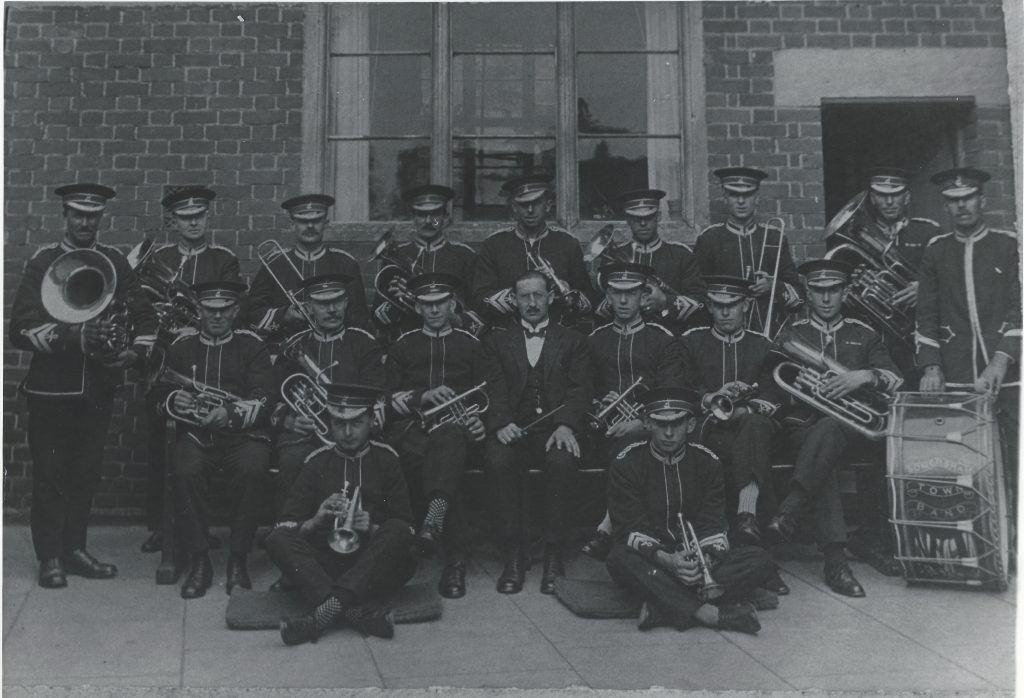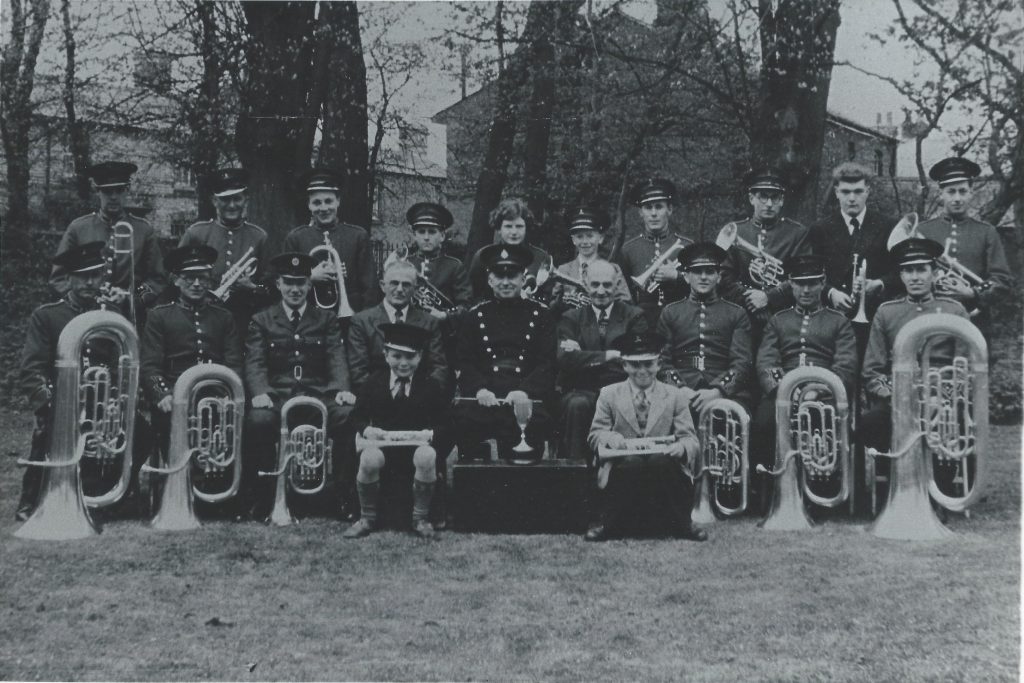
The founder: Mr William Henry Gotobed Senior was born in 1857 and raised by his grandparents in Stretham, Cambs. A self-made farmer and butcher he moved to Somersham and lived with his wife Sarah in the Chestnuts in High Street, now known as Mulberry House. He was an active and influential member of the village community, and also a member of the football club committee. In 1919 he organised and chaired a meeting with a number of his business associates to discuss the formation of a village band. At this meeting on 1st August 1919 a band committee was formed and Mr Gotobed was elected chairman, a position he subsequently held for a number of years. Mr Gotobed died on 8th August 1941 and is buried in the cemetry of the local church of St John the Baptist.
Through collections and loans from Mr Gotobed and other members, the committee managed to raise the £118-7s-6d needed for the purchase of the first batch of 15 instruments from Butter and Sons in Dublin. A membership fee of 3d per week was introduced to pay the interest on the various loans. All of this appears to have happened very quickly as, the first band practice was held just 2 months later. Under the direction of the first conductor, Mr Frank Allen, twelve members gathered in a building at the rear of Mr Goodenough’s chemist store on High Street on the 3rd October 1919. The band grew rapidly over the next few months and by the end of the year had 23 members.

In May 1920 the band committee started laying down the rules of membership, many of which have carried through and form the basis of our current constitution. By March 1921 the membership subscription and performance payments had enabled the band to pay off the original loans, accumulate £80-11s-8d for band uniforms, reduce subscriptions to 2d per week and to pay the secretary an annual salary of £2. Collections from Xmas carolling (and later proportions of the performance fees) were shared amongst the bandsmen.
The band was clearly on the way up and their services were in great demand during the 1920s and 30s. Regular fund raising dances at what is now the British Legion Palace, concerts and performances at local garden fetes and regattas provided bandsmen a small but regular income. Bookings, however, were typically a little longer than those of today. For example, the band received £6-10s.0d for attending a garden fete in Willingham, duration 2.30 to 10.30pm! There are no references to the band’s participation in contests during these early years, but we do know that they did take part in one at Long Sutton in 1924 with ‘The Dawn of Spring’ as the test piece. We do not have the minutes for the meetings between 1924 and 1935 so it is possible that they took part in others during that period.
Frank Allen resigned as Bandmaster in 1936 and was succeeded first by Clive Redhead and then in 1939 by Reg Baker. The band appears to have fared not too well during this period and, following a reorganisation in 1940, Frank Allen was restored to the position of Bandmaster. Records show no activity between 1940 and 1945, and it is assumed that the band was suspended during this war period. Committee meetings resumed in 1945 and the band began a period of rebuilding including a recruitment drive to rebuild membership.

In December 1951, some 32 years after he first took charge of the band, Frank Allen once again resigned as Bandmaster. W G (Bill) Cooper (the village barber) was appointed Bandmaster and Horace (Stan) Shadbolt (a local lorry driver and shopkeeper) was appointed Deputy Bandmaster. However, following disagreements over the type of music the band should play Horace, his 5 children and 3 other members left the band and formed the Somersham Charity Band. The bust-up made the national press; the Daily Mirror reporting that whilst the Town Band held its Sunday rehearsal in the village hall, the Charity Band set up shop in a garage 50 yards away and strove manfully to compete with multiple renditions of Teddy Bears Picnic! Horace’s band eventually accepted an invitation to merge with Somersham’s main rival, Ramsey Town Band, with Horace as Bandmaster and vowing that never again would his band play under the Somersham bandmaster! In fact, Stan Shadbrooke (jnr) re-joined Somersham band when it reformed in 1980 and was a much loved and highly respected principal cornet for 35 years. Horace also re-joined the band in the mid-80s.
Despite the loss of the nine rebels the band appears, at least initially, to have flourished under Bill Cooper and began to enter competitions. In 1953, 1954 and 1956 they took part in the Leicester Brass Band Festival (4th Section), coming 3rd, 3rd and 1st respectively. However, notwithstanding these successes declining attendance at practice was an issue raised at AGMs throughout the 1950s. Competing at the Daily Herald Midlands Festival (4th Section) and the Berkshire and Neighbouring Counties Band Festival (4th Section) in 1957 and 1958 was less successful due, in the words of Bill Cooper, to “inexperienced players and lack of full practices”. Bill Cooper resigned in 1958 and Fred Stokes took over as Bandmaster.
Unfortunately, by 1959 membership had reduced to the point that the band could fulfil its engagements only by amalgamation with the Chatteris Town Band.” When Fred Stokes resigned in June 1960, an extra-ordinary General Meeting was held at which a proposal that the band be disbanded was carried; this was later approved by the Executive Committee. Instruments, uniforms and equipment were sold and at a final Committee meeting on 24th January 1962 it was agreed that the proceeds of the sale would be divided equally between the three religious denominations in the village.
In 1980 the ex-treasurer Bill Barlow and some young players from the primary school persuaded David Chambers to try to reform the band. A small number of players from the original band also returned and a concert was given in the September of that year in the Parish Church. The band continued to go from strength to strength performing regular concerts at local venues. Contesting success followed with the band reaching the 4th section National final in 1991 and the 3rd Section final in 1992. Also in 1992 the band became champions of Cambridgeshire.
The band has not entered contests since the late 90s, preferring instead to concentrate on making music for the enjoyment of audiences and band members and to meet the many demands for our services. It continues to be a very popular brass band giving some 20 or so performances a year and remains the only senior brass band in the Huntingshire – St Ives area.
The band is a totally independent organisation and relies on donations, subscriptions and the hard work of its members at concerts and functions to finance its continued progress. The band would like to thank the people of Somerham for their generosity and continued support.